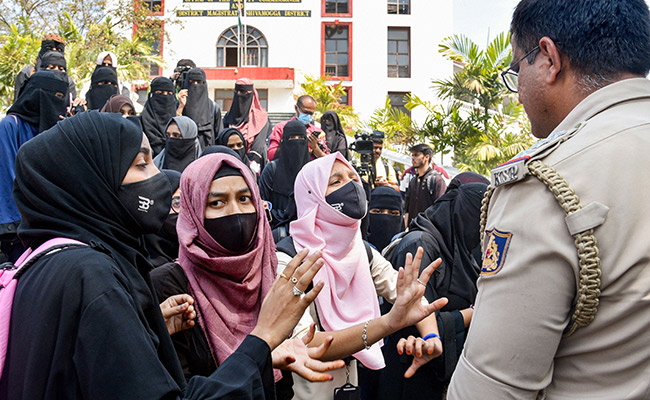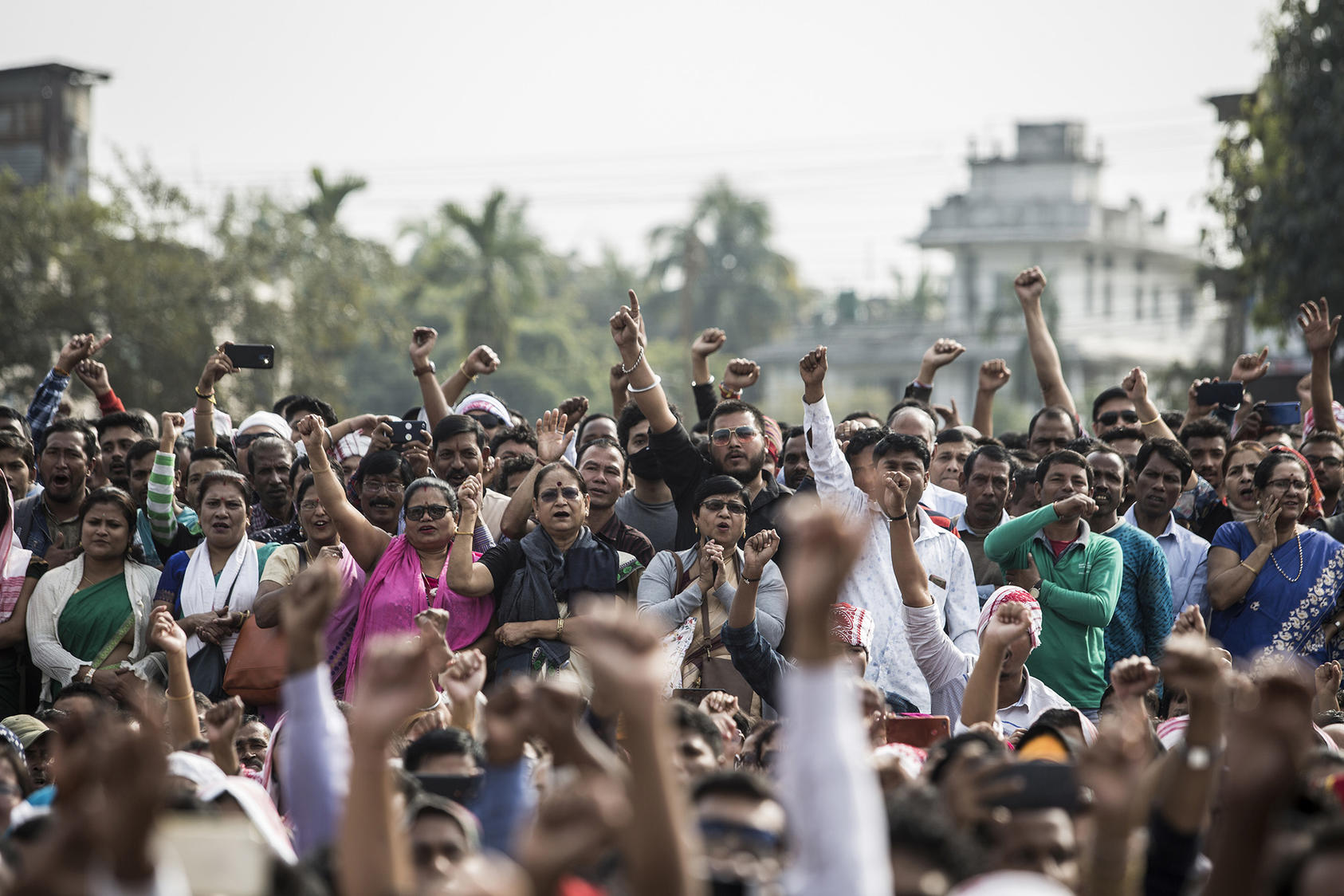Why regional parties among Muslims represent newfound faith in community-centric politics

Why regional parties among Muslims represent newfound faith in community-centric politics
Political parties today have a slightly different nature from the past. Today, they appeal to secularism and seek to organize under their banner all oppressed groups.
India’s Muslim communities have been debating their political participation since Independence, and it is becoming more and more critical as time goes by. The Muslim intellectual community actively discusses Muslims and their role in national politics following the 2014 General Elections.
Muslins are India’s most significant minority, and their plight is caused by the loss of their participation in politics. As of right now, political parties are treating Muslims as Shudras or untouchables, especially since Muslims do not have any options. Free votes are theirs; they have no option but to vote BJP due to their inherent fear of the party. The so-called secular parties of India have misused this power.
However, in recent years, Muslim political parties have sprung up, showing the community is now ready to participate in national politics. Atrocities against the community have contributed to it as well.
Unlike in the past, these political parties are somewhat different. Secularism is becoming a central theme of their appeals, as they seek to organize oppressed communities under their banner. Historically, Muslims have been treated with untouchability that has become obvious on all grounds.
A community-based political party is mandated by discrimination in day-to-day life, pogroms, fake arrests and encounters, attacks on educational institutions, and a decline in their share in politics. Muslim voters have become politically aware and value their vote has led them to offer a deal on conditions; if not, they threaten to vote for the party of their choice.
Asaduddin Owaisi, the president of AIMIM, shows that the community is feeling overcrowded and wishes for fresh air. To bridge the gap between the community and existing political parties, large scale Muslim issues have never been discussed at the political level. The community, however, has been feeling the need for a political party since the protests against CAA. “Political secularism” has become a monkey on the back for Muslim youth instead of a means to save “political secularism.”
Due to their blind faith in so-called secular parties, Muslims in Indian politics is losing share, election after election. Ultimately, this breach of trust was both misused and broken. Thousands of years ago, Abdul Jaleel Faridi, a visionary, felt this abundantly. After seeing anti-muslim riots occur under Congress rule after Independence, he opposed the Grand Old Party, calling it the biggest enemy of Muslims.
Despite being a staunch opponent of Congress, Sayeed Mahmood also joined the Majlis-e-Mushawrat (MeM) founded by Mr Mahmood, who once was projected by Congress as a means of gaining Muslim support. The group had a nine-point plan on Muslim issues and was non-political. While he eventually left the party, he always encouraged Muslims to join parties with more or more minor similar programmes.

Although the Sanyukt Vidhayak Dal (SVD), formed from the merger of several smaller parties in UP, gained power, little progress has been made for the Muslim community. Faridi had no choice but to form his own political party Muslim Majlis in 1968, whose aims were as follows:
(1) Muslims, Harijans, etc., like other backward and oppressed people, are to be awakened to their political needs and made capable of facing their oppressors and exploiters.
(2) To eliminate the sense of low self-esteem of Muslims who suffer from inferiority complexes under one banner.
(3) Assuring the protection and safety of Muslims’ lives, property, honour, civilization, language, and religious beliefs.
(4) Removing the backwardness of Muslims in politics, economics, society, and education.
(5) Combating communalism by enlisting non-Muslims who are secular.
(6) To create an environment where all citizens can live peacefully and respectably within the country.
(7) Setting up a secular system by combating injustice, injustice, inequality, prejudicial policies from the government.
(8) Preventing the exploitation of the poor and weak by capitalists and oppressive rulers.
The programme of improving many oppressed and backward communities, which Faridi advocated, could be achieved more effectively through electoral politics in which power can be shared. His party was formed in the same year, and Periyar and other Dalit leaders attended a conference in Lucknow the following year.
In grassroots politics, Dalit leaders like Kashi Ram later evolved this movement. The leadership of Faridi is an example to all of us of how to lead in a post-Independence India when the oppressed are given the confidence to demand their political rights. Unfortunately, the Muslim community did not find anyone to preserve his legacy.
The need for a political party of Muslims has become evident since 2014, especially since the anti-CAA/NRC protest. Professor Basir Ahmad Khan and Imran Eijaz joined Faridi’s party as national and state secretaries. Eijaz says the lack of Muslim representation in Indian politics is the root cause of Muslim backwardness.
A community-based party that raises the concerns of Muslims with honesty is essential, as he views politics as an umbrella without which the condition of Muslims cannot be improved at large. Muslims are generally concerned about the country’s poor quality of political leadership. Despite their honesty, devotion, and well-intentions, Muslims view their political leaders as too focused on short-term goals and struggles. They lack a vision for strategically advancing Muslim communities’ welfare and status.
As a result of their association with secular parties, the older generation of Muslim leaders is seen as culturally being divorced from the concerns of ordinary Muslims. Young people today, however, are not prepared to compromise with their votes. Many of these educated voices, such as Sharjeel Imam, succeeded in making the masses believe that so-called secular parties are anti-communal and Islamophobic and cannot be trusted by the community.
“The scattered Muslim vote is also responsible for the poor treatment Muslims get from political parties,” writes Amit Pandya in Muslim Indians: Struggle for Inclusion. Several political parties dominate Muslim power, and the voice of Muslims varies depending on region and subcommunity. The reach and depth of Muslim issues in secular politics are restricted, even among politically active Muslims who are not in influential positions within secular parties.

A new uprising is defining politics today.
Despite Muslims persisting in all states run by secular parties, whether Bihar, Uttar Pradesh or even Communist West Bengal, Abhishek M Chaudhari argues that Muslims have never developed a strong political party in any state run by a “secular” party. The Muslim community has grown tired of receiving treatment from secular parties and are willing to give up their political rights.
In many states, the political landscape of the last 30 years has been defined by the emergence of state-based parties comprising numerous OBCs and Dalits. Muslims may be looking for their agency in the 21st century. It is a new uprising by marginalized groups and oppressed people, who have concluded that there is no other way to achieve the equality they seek than their political party. Nearly all castes and different prominent identities have engaged in political mobilization.
Among the social groups in India, only the Muslims have not yet discovered their bargaining power. The most surprising thing is how long it took Muslims to realize none of the parties offered them representation or share of power that they deserved as part of the 14 per cent of the population.
The confidence Muslims lacked in the past is now being rediscovered after being buried by the scars of the Partition for seven decades. Secular parties are not happy with them since they do not consider them stakeholders or partners but rather a burden.
The educated youth of the Muslim community have aspirations in the political arena, and they believe that only identity politics can offer their community hope for upward mobility. They use historical blunders to convince their community of the need for their political party, using the losses they have suffered by supporting secular parties.
Some of these young people are prominent, such as Amir Mintoee of the Aligarh Muslim University Coordination Committee (AMUCC), which he established shortly after police atrocities against students on December 15, 2019. AMUCC is an organization formed by Mintoee to promote identity politics among Muslim elites throughout India.
Since he is a history major, he has compiled a comprehensive argument for why Muslims should stop relying on secular parties. Among the Muslim community, there is a recent development where the community is now talking about using its strength for community upliftment instead of participating in the ‘BJP harao’ campaign being carried out by the secular parties.
Organizing political parties with the interests of the majority community in mind is part of the surge of regional parties of Muslims (Abhishek M Chaudhari: Rise of Muslim Political Parties). Several parties are becoming significant players at the regional level, such as Welfare Party of India (WPI), Social Democratic Party of India (SDPI), Peace Party (PP), Rashtriya Ulema Council (RUC), All India United Democratic Front (AUDF), and All India Majlis Ittehad ul Muslimeen (AIMIM). A
IMIM has already received a positive response at the national level from the Muslim community. National politics could take a turn with the emergence of these parties, taking a turn where a Hindu party aligns with Muslim and Dalit parties. The secular parties deserve the credit for ignoring Islam’s most significant minority and losing their trust, while the Muslims are claiming their political share. Consequently, this can have a profound impact not just on the political status of Muslims in India but also on the nation’s political dynamics.
There are currently protests by Muslim women in Karnataka to wear hijab at schools, but schools’ uniform is as crucial as their education.
)
An essential role of school uniforms is to build the character of a nation. Education is critical, but uniforms play a much more significant role. Seeing different colours flying during morning assemblies is just ridiculous, especially when children themselves give quotes and short speeches as a means of teaching discipline and a sense of solidarity.
I believe uniforms play a significant role in character building, and the best example is the uniforms used by the armed forces of any country. Maintaining uniforms in any organization is a source of pride. The school system nurtures budding citizens of a country, so it does not make sense to separate children based on their religion. No matter what his position in society, every child has a right to education according to our ancient philosophy. In addition, Islam also teaches that the Pyjamas should be put above the takhana or hijab in their Madarsa.
Modern education can never be reconciled with stern religious practices. It is imperative that religions evolve with time, and a Muslim religion that remains in its state from the sixth century cannot progress. Muslims originating from the middle east couldn’t develop petroleum under their land. From that aag, they kept therapy called Danavi Aag. The development of this petrol was a significant factor in their prosperity. Veiling is part of religion as determined by surveys and studies of social behaviour in Islamic countries.
Muslim women suffer the most from religious sycophancy, evidenced by the triple talaq and their status in Muslim societies. To develop joint manship and brotherhood, they can play any field with Hizb and Salva Kamij.
Due to their early involvement in Madarsa for religious teaching. Historically, reducing religious orthodoxy in Muslim societies is known to minimise religious extremism. Muslim politicians considering the Muslim vote bank do not wish to consult religious leaders on the issue. Women working in the poultry industry in Luckbiw or Zari workers in Benarsi sprees know the plight of these workers.
Let us enact a law against triple talaq, as suggested by the SC, and adopt a uniform civil code in society. In a democratic nation, let Muslim women become progressive. Ultimately, the debate will cease, and Muslim women will be able to build a better future for themselves and their country.
Education and religion should be kept separate

People of all religions live in harmony together in a democratic country such as India, where all religions are given equal rights and rights.
The Hijab issue in Karnataka has sparked a wave of protests across the whole country just a few days ago.
Rebellions continue to be instigated by those who wish to disturb the unity of India.
Religions have equal status in India, and all citizens respect each other’s beliefs; whether it be Holi, Eid, Christmas or Lohri, people celebrate all festivals together.
We were never told what our religion was in education institutions while we were taught we were Indians in school.
Institutions of higher learning strive to keep religion out of education so that everyone can live together in harmony.
What about our educational institutions today causes us to wage war on our religion?
The power of education equalizes all religions since it gives equality to all.
The idea of equality will end if the hijab is permitted in educational institutions.
The whole country respects Islam, and the hijab is essential in Islam.
Therefore, religion should be kept away from educational institutions to preserve India’s unity.
Currently, people are dividing the country by using the hijab as a shield.
Somewhere, this religious division is destroying our unity.
India does not have any restrictions on the wearing of the hijab
Nonetheless, it is wrong to wear hijab in educational institutions as there are certain rules that all students should follow, regardless of their religion.
Teachers do not give education to students based on their religion in educational institutions, so why are educational institutions distributed based on religion?
Let’s end this religious fight in educational institutions to preserve peace.
And keep India united.
“The opinions expressed here are the writer’s own and do not represent the company’s views”.
edited and proofread by nikita sharma




